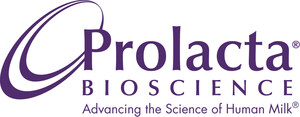DUARTE, Calif., July 25, 2018 /PRNewswire/ -- Prolacta Bioscience®, the pioneer in human milk-based neonatal nutritional products for premature infants, announced today that a new analysis, published in the journal Breastfeeding Medicine, found additional clinically significant benefits of an exclusive human milk diet (EHMD)[1] for extremely premature infants in the neonatal intensive care unit (NICU), when compared to a diet containing cow milk-based products.
Results from the analysis, "Beyond Necrotizing Enterocolitis: Other Clinical Advantages of an Exclusive Human Milk Diet," showed that infants fed an EHMD required significantly fewer days of parenteral (intravenous) nutrition (PN) and attained full enteral feeds significantly sooner than infants fed a diet containing cow milk-based fortifier or cow milk-based formula. The analysis also found a trend toward fewer days of ventilator support for infants on an EHMD.
Using standard analytical techniques to combine data from two previously published clinical trials,[2],[3] the researchers examined the effect of varying amounts of cow milk-based products on specific interventions. They found that the number of PN days and the time to full feeds increased as the amount of cow milk-based nutrition in the premature infants' diets increased, suggesting a dose-response relationship. Taken together, these analyses point to results that could potentially lead to substantially reduced costs of care for infants on an EHMD.
"We are only beginning to unlock the full potential of an exclusive human milk diet in extremely premature infants," said Amy Hair, M.D., first author of the paper. "This data underscores the clinical and cost consequences of using cow milk nutrition in the NICU." Dr. Hair is a neonatologist and an assistant professor of pediatrics at Baylor College of Medicine, and the director of the Neonatal Nutrition Program at Texas Children's Hospital in Houston, Texas.
The analysis included 260 extremely premature infants born weighing less than 1250 g (2 lb 12 oz) at birth, who were evaluated in the two previous studies2,3. Infants were randomly assigned to receive an EHMD, including mother's own milk or donor human milk and Prolacta's Prolact+ H2MF® Human Milk-Based Human Milk Fortifier, or a diet of mother's own milk with cow milk-based fortifier, or formula. The research examined any relationships between the volume of cow milk nutrition in each infant's diet and the number of days they received common interventions in the NICU, including PN and the number of days until full enteral feeds were achieved. The number of days that a central line, ventilator support and oxygen supplementation were used were also evaluated.
About Prolacta Bioscience
Prolacta Bioscience, Inc. is a privately-held life sciences company dedicated to Advancing the Science of Human Milk®. The company pioneered the development of human milk-based neonatal nutritional products to meet the needs of critically ill, premature infants in the NICU. Prolacta leads the industry in the quality and safety of nutritional products made from donor breast milk and operates the first and only pharmaceutical-grade manufacturing facility for the processing of human breast milk.
[1] An exclusive human milk diet (EHMD) is achieved when 100 percent of the protein, fat and carbohydrates in an infant's diet are derived from human milk. This diet includes a human milk-based human milk fortifier.
[2] Sullivan S, et al. An Exclusively Human Milk-Based Diet Is Associated With a Lower Rate of Necrotizing Enterocolitis Than a Diet of Human Milk and Bovine Milk-Based Products. The Journal of Pediatrics. April 2010. 156(4):562-567. doi: 10.1016/j.jpeds.2009.10.040. The randomized analysis of 207 infants weighing 500 to 1250 g compared the benefits of an exclusive human milk diet with a diet of both human milk-based and cow milk-based products.
[3] Cristofalo EA, et al. Randomized Trial of Exclusive Human Milk Versus Preterm Formula Diets in Extremely Premature Infants. The Journal of Pediatrics. December 2013. 163(6):1592-1595.doi: 10.1016/j.jpeds.2013.07.011. The multicenter randomized controlled analysis examined 53 extremely premature infants weighing 500 to 1250 g who were fed either a bovine milk-based preterm formula or an exclusive human milk diet, comparing the duration of parenteral nutrition, growth and morbidity.
SOURCE Prolacta Bioscience
Related Links
WANT YOUR COMPANY'S NEWS FEATURED ON PRNEWSWIRE.COM?
Newsrooms &
Influencers
Digital Media
Outlets
Journalists
Opted In





Share this article